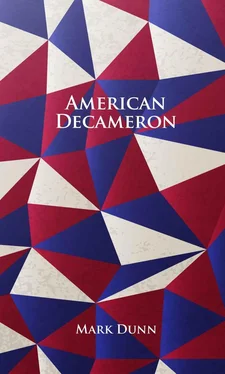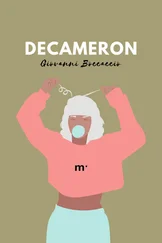Anyway, Carthy McCharlie was the name that Johnny Humphries gave his dummy, who was, as you can probably guess, the department-store version of Mr. Bergen’s monocled, tuxedo-wearing sidekick. Johnny was a fourth grader, and as far as we second graders were concerned, old enough to go off and join the army or father children or something. Fourth graders didn’t stoop to talk to second graders unless they were related to them, and that’s why I didn’t say anything to Johnny when he set that dummy on the chair in a way that looked dangerously tottery while he ran off to get the glass of milk his mama was holding for him just offstage. Johnny brought out the glass of milk to show that he could drink it while Carthy kept talking, although sometimes he would get so nervous that he’d forget just who was supposed to drink the milk, and end up pouring it down Carthy’s shirtfront.
Carthy had lost an eye from a pop gun, so there was a patch over the eye that didn’t have the monocle, and sometimes his leg would fall off in the middle of Johnny’s routine from being so roughly handled by a rambunctious nine-year-old boy. And Johnny, who was usually prepared for just such a possibility, was at the ready with a line like, “Hey, Carthy! Looks like somebody’s been pulling your leg!” One time he said “durn leg” and he got in a little trouble with his mother, who was a Sunday School teacher in the Baptist church and thought that substitution words like “durn” and “dang” were just as bad as saying the real thing because the thought was there, and God knows what is in our thoughts.
So, like I said, I would have told Johnny that he was setting Carthy McCharlie on that chair in such a haphazard way as to invite disaster, since the chair sat so close to the edge of the stage, but I decided it would probably be best for me to keep my mouth shut. Especially since it was a rule — largely applied to me alone — that when Maryanne and Piddy and I were just offstage getting ready for our number, I was supposed to keep my thoughts to myself and my flapping lips buttoned up tight. And it was a true challenge because of how much of a little chatterbox I was. So anyway, I watched in delicious horror as Carthy slid off that chair and then fell forward right into the orchestra pit, and when Johnny came back to find that his dummy was gone, he started looking all around in a panic, as if Carthy McCharlie had gotten right up and walked off by himself, bad leg and all.
Right after asking Avis the custodian to go down into the pit with Johnny to rescue Carthy, Mr. Jones, who owned the theatre and emceed the talent show, pointed to Maryanne and Piddy and me, which meant it was our turn now to come out on stage and to position ourselves as close to the microphone as possible so the people listening to their radios could hear the sound of our taps. And nobody thought there was anything odd at all about doing on the radio something that was best beheld by the eyes, the radio being an exclusively sound medium. They just listened to the tattoo of our tap shoes as they struck the wooden floor (more thuddy-thunk than clickety-clack) and tried to picture in their heads what our feet and legs and arms could possibly be doing. After all, tap dancing on the radio made just as much sense as ventriloquism on the radio.
And while we’re on the subject of talents that don’t translate too well via the radio medium, a listener couldn’t see Geneva’s hula arms and hips either. And they also couldn’t see Nora Gibson’s demonstration of how best to pack a picnic basket, although she got better over time as far as offering a running commentary on what she was doing. “Now I am laying the toasting forks next to the other utensils. Make sure when you do this at home that you keep them all pointed in the same direction so as to avoid injury upon retrieval.” (I know good and well that Nora’s aunt, Miss Gautreau, our librarian, wrote everything out for her to say because Nora’s instructions sounded just like some of the handmade signs that Miss Gautreau had hanging around the library. For example, in the little girl’s room there was a sign that said, “No one is too rushed not to flush. Please read this sign twice.”)
So anyway, while Avis and Johnny Humphries were bumping around down in the orchestra pit, the three of us who matriculated at Hiram and Helene’s School of Dance and Loveliness were hastily ushered out onto the stage by Mr. Jones’ pretty assistant, Miss Lighthouse. And Mr. Jones introduced us with his peppy, cheerful voice — a voice that always made you think that there was absolutely nothing wrong in the world that couldn’t be fixed by listening to his talent show on the radio. Not war or poverty or hunger or even the dreaded plague of unionization.
The song that Maryanne and Piddy and I danced to was the one that Shirley Temple and Bill Robinson tapped up and down the stairs to in The Little Colonel . We had learned our steps to the tune of “Yankee Doodle Dandy,” but Mrs. Taliaferro said it was better to be Yankee Doodle Dandies around the Fourth of July and only Kate Smith was permitted to be patriotic all year round. Mrs. Taliaferro gave us the tempo of the new song and said everything would be fine. It would be just like falling off a log.
Hiram and Helene Odell’s “Dancing Trio” stayed with the music and kept in sync with one another pretty well, I have to say. It helped that this was the tenth or eleventh or twelfth time we’d danced in competition together. Up until this point we’d never won, though. Geneva did a couple of times, but more often it was Corinne Lester who took home the big prize. Corinne liked to deliver dramatic readings in which she would punch the air with her fist at a predetermined climactic moment, and sometimes she would recite inspirational poetry with clear rounded vowels and some degree of urgency. We always thought that Corinne Lester was good enough to go to Hollywood, but I don’t think she ever tried her luck there. The last I heard — and this was years ago — she was a shoe buyer for a department store in Jackson. I heard that she personally sold a pair of snakeskin slingbacks with five-inch heels to Eudora Welty, who brought them back the very next day after the shoes made her fall down in a restaurant. The only time that Corinne didn’t win or at least take second or third place was when she recited “Invictus.” The judges (who were Mr. Jones and Miss Lighthouse) were complimentary of Corinne’s impassioned delivery, but couldn’t in good conscience give her an award, since the poem was generally regarded as atheistic and the Dixie Theatre was a Christian movie house.
But this was the Saturday that we thought we had a good chance of winning, because there’d be a little something special about our performance that day, which was our teacher Miss Odell’s idea, but which we liked just fine: we each got to wear little tiaras on our heads.
“You look so much like little princesses,” said Miss Odell, “you make me want to genuflect. You do. Right here. Right now.” This is what Miss Odell had said at our dance lesson the afternoon before. And her bachelor brother Hiram, overhearing her from the front office of their dance studio, shouted his enthusiastic concurrence. Then, for a reason that was not clear to me at the time, Miss Helene Odell began to weep. She spent a long time after that in the powder room while her brother had us doing fondus and pliés while he sang “That Old Black Magic,” and “You Make Me Feel So Young,” and finally, “Chi-Baba, Chi-Baba (Bambino Go to Sleep),” which had been popularized a couple of years earlier by Perry Como.
“The only thing that will make it official,” said Miss Odell, finally emerging from the powder room while blotting her eyes with a wad of toilet paper, “are sparkly little rhinestone diadems. One for each of you. Let me get you each a tiara and then I defy Mr. Jones not to be enchanted and enchained.”
Читать дальше












